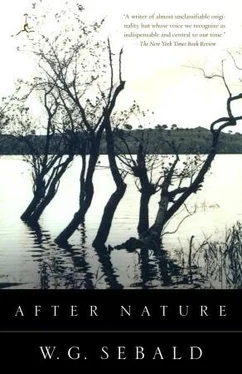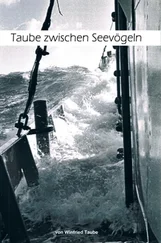when, from the half-shadow
of the mustard tree by the aviary,
the Patriarch of Novgorod,
Archbishop Theophon, steps towards him
with a tiny yellow parakeet in his hand,
and in the course of a Latin conversation
tells him a legend from the region of Dolyi,
which relates that God quite suddenly
and as though out of the blue came
into being on a lungwort leaf.
For four years Steller remained
in Petersburg. The Primate, already
close to death, obtains for him the post
of an assistant in the Academy
and takes him into his own house
as a personal physician.
Under night’s biretta the old man
talks with his younger brother
of the winged end. To comfort him
Steller speaks of the light of nature.
But all things, Theophon says,
all things, my son, transmute
into old age, life diminishes,
everything declines,
the proliferation
of kinds is a mere
illusion, and no one
knows to what end.
The long Arctic journeys
had frayed the nerves of the
Academy member Daniel Messerschmidt.
Steller, who found Messerschmidt still living
in the summerhouse he occupied
with a baker’s daughter
from Sesslach, came too late
to get anything out of
the deeply melancholic man.
Instead, he now studies his papers.
He spends the whole summer
bent over the jumble of cards,
while the naturalist’s neglected
wife, gaudily dressed, sits
beside him and with her split
fin strokes the glans that throbs
like his heart. Steller feels science
shrinking to a single slightly
painful point. On the other hand
the foam bubbles, to him, are
a paradigm. Come, he whispers
into her ear in his desperation,
come with me to Siberia as
my true wife, and already hears
the answer: wherever
you go I will
go with you.
When in 1736 Steller did indeed
receive the longed-for appointment
to join the Bering expedition,
this enterprise, launched ten years previously,
consisting of an army of carpenters,
blacksmiths, grooms, mariners,
clerks, commissioned officers,
scientists and assistants,
and of not only building materials, tools, instruments,
an arsenal of weapons and many hundreds
of books, but also endless
forage trains for the team’s provision,
crockery and clothing and crates
of claret for the higher-ranking
Academy emissaries, to be dragged onwards,
no different from a glacier pushing
great heavy masses of scree in its passage,
arrived at Yakutsk on the one hundred and
twenty-ninth degree of longitude, east.
Steller mastered the five thousand miles
in the course of the three and a half years
which Vitus Bering still needed
to convey everything, down to the last nail,
with his little Siberian packhorses
over the Yablonovy Range to
the Sea of Okhotsk. In the process
he accustomed himself to endure
deprivation and loneliness for
the sake of the baker’s daughter,
whom, in the hope that
perhaps even in far-off places
one might feel at home and on the grounds
of her seemingly unconditional
promise to travel gladly with him
to any parts wheresoever, he’d made his wife,
but who in the end, naturally, had not been willing
to make that journey halfway round the globe
together with him. In place of her, Steller
now had two young ravens,
which in the evenings dictated
ominous sayings to him.
When he wrote these down
he felt some comfort, although he knew
that even with these he would not
arrest the slow corrosion
that had entered his soul.
On the twentieth of March, 1741,
Steller stepped into the long
blockhouse of the Petropavlovsk
command post on the eastern shore
of the Kamchatka Peninsula.
In a windowless recess, no larger
than six feet by six, at the far end
of the building’s interior,
in no other way subdivided, he finds,
at a table of planks nailed together,
covered by land maps
and sea charts showing
vast tracts of whiteness,
Bering, the Commandant-captain,
his fifty-nine-year-old
head supported by his
right hand tattooed
with a bird’s unfolded wings,
the left hand holding
a pair of dividers,
sitting motionless
in a flickering light.
It takes an uncannily
long time, Steller thinks,
for Bering to open
his eyes and look
at him. What is this
being called human?
A beast, shrouded
in deep mourning,
in a black coat
lined with
black fur.
For two weeks, with the wind fair,
the ships named after the saints
Peter and Paul had borne south
on the Arctic Ocean,
but the legendary land Gama entered
on Delisle’s map nowhere emerged
from the water’s waste. Only once on the
shimmering surface ahead did the watch
make out something black
covered with countless seabirds.
Plumbing the depth, they approached
till it was clear that the island rock
was no more than a dead whale many times magnified
by the mirage’s play, adrift belly up.
After that the course was set
to north-northeast. In the nights,
at times the sea lit up,
and to the sails splattered
by the crests of waves
sparks of that light adhered.
In a second mirage
one evening, across the horizon’s length
appeared a tract of land,
all crystalline marble,
but not until the morning of July 15th,
almost six weeks after setting sail
from the Bay of Avatsha,
did Steller, who always went on deck
in the early hours, truly see
between the low-drifting clouds
the feebly cross-hatched contour
of a mountain range.
In the evening of that day
the mist completely lifted.
A black sky
now overhung the sea and
the snow-covered, ragged merlons
of Alaska loomed “resplendent,”
the word that seemed right to Steller,
in rosy red and purple colours.
Vitus Bering, who throughout the voyage
had lain in his cabin staring
at the ceiling of beams above his head,
roused by the incessant jubilation
of the crew, for the first time came aloft
and contemplated the scene
in a fit of deepest depression.
Unending flights
of screeching birds, which skimmed
low over the water,
from afar resembled
drifting islands. Whales
rotated around the ship, emitting
water-spouts high into the air
in all directions of the compass.
Chamisso, who later marvelled at
the same spectacular sight
on the Romanzov expedition,
was led to think that perhaps
these animals could be tamed
and — no different from geese
on a stubble field — be herded
with a rod, as it were, on the sea.
Bring up the young in a fjord, he wrote,
fasten a spiked belt buoyed up by
air-bladders under their pectoral fins,
let them unlearn their submersions,
make experiments. Whether the whale is
then to draw or to carry,
whether and how it is harnessed
or laden, how it is bridled
or otherwise governed, and who is to be the
mahout of this water-elephant — all this
will settle itself in time. Chamisso,
it is true, also writes
Читать дальше












